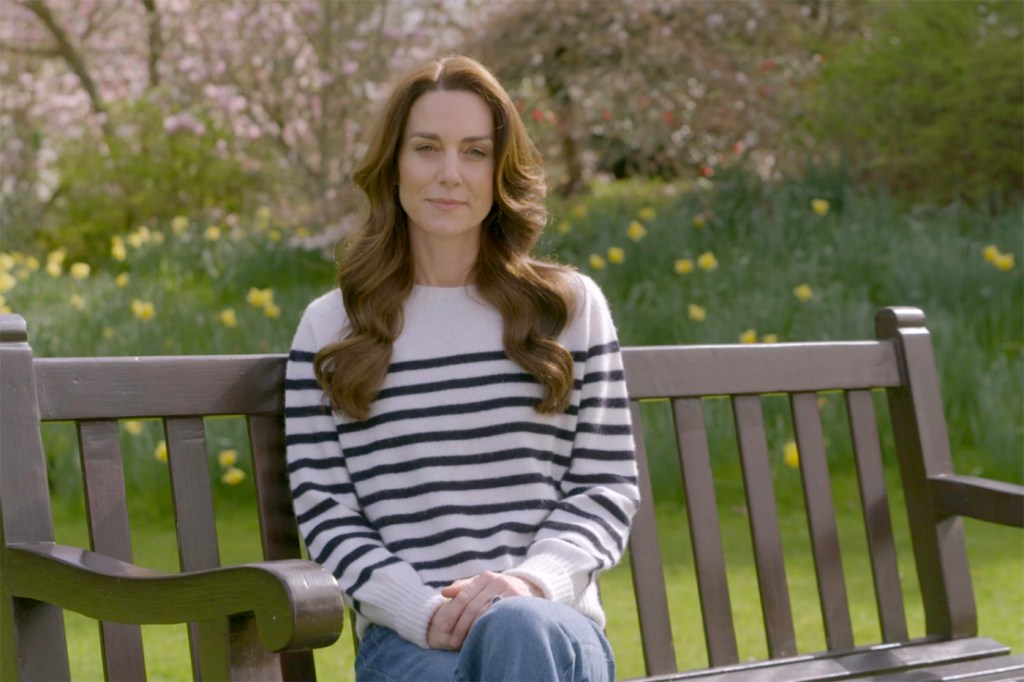Kate Middleton’s cancer ‘hard to pinpoint’ but announcement is ‘truly a public service.’ It may motivate others to get screened, experts say
“Even though they were not terribly forthcoming with all the details about these sorts of things, it’s truly a public service,” Northeastern psychologist Laurie Kramer says.

Catherine, the Princess of Wales, announced in a video Friday that she is undergoing treatment for cancer.
It is the second cancer diagnosis for a member of the Royal Family in as many months. King Charles III announced his own cancer diagnosis and treatment in early February.
Northeastern University psychology expert Laurie Kramer praised the family for being public about the diagnoses — both Middleton’s and the king’s — as it may enable more people to get screened for cancer and understand the risks of a diagnosis.
“It’s unfortunate this is happening, but them putting this out publicly can help other people,” Kramer says. “Even though they were not terribly forthcoming with all the details about these sorts of things, it’s truly a public service.”
The princess, commonly known as Kate Middleton, said in the video that she was advised to “undergo a course of preventative chemotherapy” and is now “in the early stages of that treatment.”
She did not specify what type of cancer she has or at what stage it was found.
Northeastern University cancer researcher Bryan Spring says the limited information released by the royals makes it “hard to pinpoint” what exactly the type of cancer may be.
Featured Posts
“She had an abdominal surgery thinking there was some benign mass to remove, and then they found cancer. That’s about all we know,” says Spring, who noted he is not a clinician. “Of an abdominal malignancy, anything in the gastrointestinal tract, any of those organs could produce cancer and it could spill out into the abdomen.”
He said that many questions remain, however, including the extent and size of the mass that doctors removed and where it was located.
These add to the speculation and uncertainty surrounding the royal family — specifically Middleton.
Kensington Palace announced on Jan. 17 that Middleton had undergone planned abdominal surgery the day prior and would be hospitalized for 10 to 14 days and absent from public duties until Easter. But the public — and the internet — filled the void with speculation about Middleton, who hadn’t been seen in public since Christmas.
The intrigue only grew when wire services retracted the first photo Kensington Palace posted of Middleton and her children since the surgery, saying it was too altered to run. Middleton apologized, saying it was a result of her experimenting with editing. But many people did not believe the Princess of Wales was editing her own photos, inspiring more conspiracies about her condition, marriage and the family as a whole.
On Friday evening in Britain, Middleton appeared in a prerecorded video broadcast on the BBC describing her cancer diagnosis as a “huge shock” and asking for “time, space and privacy” for herself and her family.
“It has taken me time to recover from major surgery in order to start my treatment,” Middleton said. “But, most importantly, it has taken us time to explain everything to (children) George, Charlotte and Louis in a way that is appropriate for them, and to reassure them that I am going to be OK.”
“As I have said to them; I am well and getting stronger every day by focusing on the things that will help me heal; in my mind, body and spirits,” Middleton continued. “We hope that you will understand that, as a family, we now need some time, space and privacy while I complete my treatment.”
Kramer says that children as young as George, Charlotte and Louis — who range in age from 5 to 10 — are likely to be very emotional with the news.
“Verbally crying, screaming, maybe through art expressing their feelings more indirectly, those all can be things that we see at this time, and allowing children to express these thoughts and feelings, I think are really very critical,” Kramer says.
The children are also very likely to be afraid of how their lives would change should the diagnosis be fatal.
“That uncertainty just throws a blazing arrow into all of this because you can’t always anticipate the outcome will be as smooth or as quick or as positive as you want it to be,” Kramer says.
Cancer is also not something that you tell your kids about, deal with their reaction and then it’s over, she says. Rather, Kramer describes it as “a moving target.”
“It’s a continual process of helping them understand and of giving them a sense that you’re doing everything possible to have the best outcomes for them to be hopeful,” Kramer says. “But also to have some sense of realism around this should her condition get worse or if she’s not doing well with the chemotherapy or other measures that the physicians use.”
“This requires a lot of patience and understanding, and a lot of willingness to let kids be emotional and express their feelings in whatever way makes sense for them,” Kramer continues. “It is so challenging to be a parent and to be ill to be dealing with this.”
And while the Royal Family certainly has support systems beyond those of a typical family, the challenges they face are only exacerbated by their “stiff-upper-lip” public persona.
“I certainly hope that the three children are allowed to express wild emotions if that’s what they’re experiencing and feeling, as that may be a way for them to cope,” Kramer says. “I hope they have the ability to do that and are not forced to be these public models of whatever our vision is of how to cope.”
“My heart breaks,” Kramer says.











